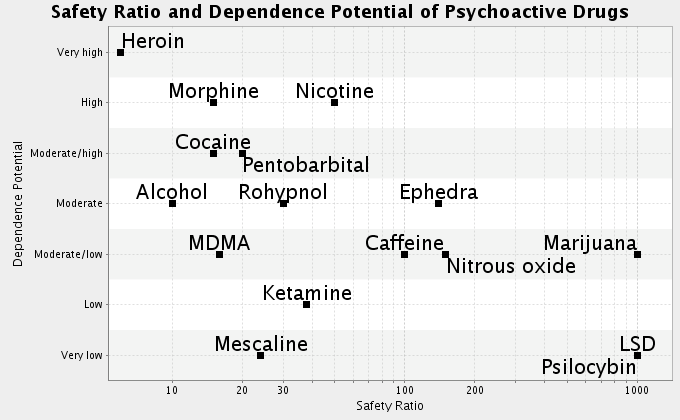'day-to-day harm for an average user of LSD or mushrooms'? do you know what the fuck you are talking about?
LSD and psilocybin metabolises very quickly and leaves the body. neither carry physical risks from toxicity or overdose. neither are toxic to the body. neither leave one with a physical hangover, a comedown, let alone an addiction or dependency. i.e. the effects of both are entirely transient, a 'trip', which may be unpleasant and emotional and challenging, but is very much a 'trip': you come back to where you started with no harm done. this was my only point to finray: everyday drugs like caffeine (and alcohol and tobacco, yes) incur a much bigger 'cost', i.e. harm, whereas these drugs are totally non-toxic. you won't get a headache withdrawing from them and you won't get a hangover.
my point was that caffeine technically does do more harm and involve more 'work' for your body to metabolise and process. caffeine is more toxic. the physical side-effects of consuming caffeine and the complications if you consume >300mg a day are multiple, involving cardiovascular health, bone and muscle health, and even fertility. the adverse physical effects – the HARM of caffeine is precisely why it comes with health warnings for children and women pregnant with a child. it has a PHYSIOLOGICAL EFFECT. what you can't seem to understand is that LSD and mushrooms have NO physiological effect; a fit and healthy person, with no pre-existing mental health issues, can take a normal dose of them and suffer NO harm. this is why acid and mushrooms are being researched and recommended – in the lancet, by john hopkins university, in uk policy debates – as CURES and MEDICINE for depression. you really can't seem to get your head around that. caffeine is a STIMULANT: all stimulants have costs. they incur a debt, they put you in a hole, they mess with your serotonin and dopamine levels; your brain gets 'fried', to use your language. acid and mushrooms have almost ZERO metabolic footprint.
so to recapitulate. the known and well-documented risks and adverse side-effects of high caffeine use (i'll say > 300mg or 4-5+ cups a day):
CARDIOVASCULAR
(-) Caffeine is a vasoconstrictor and stimulant.
(-) Caffeine often increases blood pressure by contracting the heart and blood vessels in non-habitual users. Effects usually subside after 3 – 4 h.
(-) Caffeine changes the electro-physiological activity of the heart, increasing conductivity, even in limited doses.
(-) Heavy caffeine consumption raises (by about 2 mmol/L)the plasma levels of homocystine, a risk factor for heart disease.
(-) Caffeine raises plasma epinephrine and norepinephrine levels in non-habitual users.
(-) Coffee intake may raise serum cholesterol levels. Intakes of 5+ cups of unfiltered have been shown to raise cholesterol levels by 0.5 – 1.0 mmol/L (20 – 40 mg/dL).
GASTROINTESTINAL
(-) Caffeine stimulates gastric secretion. Some individuals are sensitive to caffeine and suffer ill effects such as acid indigestion, heartburn, abdominal pain, gas or constipation to varying degrees.
(-) Coffee can cause emesis (vomiting)
(-) Caffeine inhibits vassopressin, it acts as a powerful diuretic (it increases urination.)
(-) Liver metabolism is effected by methylxanthines such as caffeine. It increases the levels of cyclic AMP and decreases the level of branched chain and aromatic amino acids in plasma.
MUSCULAR/SKELETAL
(-) Caffeine can mobilize calcium from cells and may lead to bone mass loss.
(-) Caffeine consumption is a risk factor for osteoporosis.
(-) Caffeine affects skeletal muscle contractility.
(-) Tremor is a common side effect of caffeine consumption.
REPRODUCTIVE
(-) Caffeine, particularly in doses of 300mg (3 cups of coffee) or more per day, can result in both male and female infertility.
(-) In animal tests, high caffeine consumption was associated in poor pregnancy outcome: spontaneous abortion, congenital malformations, fetal growth retardation, and residual effects in the newborn.
RESPIRATORY
(-) Caffeine stimulates respiration. This effect is mediated by the neurotransmitters dopamine and seratonin.
caffeine is addictive. people are putting themselves through this physical process every single day. a person will take acid or mushrooms once in their life, perhaps, and attain a new spiritual perspective. 'day to day harm'? nobody takes psychedelics on a day-to-day basis. they are non-addictive and have the LOWEST abuse potential of ANY drug. nobody is doing mushrooms one a week or taking acid at every party they go to; they are not party drugs.
the ONLY long-term harmful effects of hallucinogens are persistent psychoses such as schizophrenia. these present in a fractional number of people with pre-existing mental health issues or genetic predisposition, the same slice of unfortunate people who will suffer persistent psychoses from weed use. weed has now been medically approved in most of the united states so evidently the medical profession considers these percentage to be infinitesimally low. you talk about these nightmare psychotic scenarios as if they are common for acid users. it is disingenuous in the extreme.
Last edited by uziq (2017-03-09 13:16:38)
